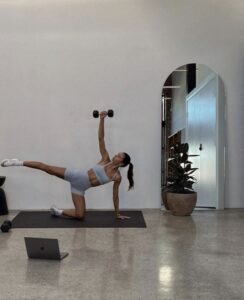Searches for “am I depressed or lazy” have surged by 120% over the past month, coinciding with longer and darker nights. However, science says it’s completely normal for ‘winter laziness’ to kick in. Colder months can often leave us feeling sluggish and a little out of energy with a shocking 61% of Brits stopping exercise completely during winter.

But did you know that staying inactive for too long can impact your physical and mental wellbeing?
To help combat this, the fitness experts at Live Football Tickets partnered with Kieran Sheridan, physiotherapist and founder of GulfPhysio, to provide their top tips on staying motivated and active this winter, with safety in mind.Feeling sluggish in the cold? Experts reveal why staying active is crucial this winter.
Feeling sluggish in the cold? Experts reveal why staying active is crucial this winter –
Mentally: It protects your mood from winter’s grip
The experts at Live Football Tickets commented:
“Research shows that light activities, like slow walking and housework decrease in winter, while time spent sitting and sleeping increases. This lack of movement and socialising can leave you more vulnerable to Seasonal Affective Disorder (SAD), which affects nearly 1 in 3 in the UK.
Physical activity helps boost the production of mood-enhancing chemicals like endorphins and reduces stress hormones. While it can be hard to find the motivation to get up and move during the darker months, regular exercise, even quick stretches, can lift your energy and soothe anxiety.”
Physically: It keeps your muscles and joints active
“Reduced movement in winter months often leads to stiffness in muscles and joints, increasing the risk of aches and pains. While cosying up for a Christmas movie marathon is fun, don’t forget to take breaks to stand, stretch, or walk around regularly. Long periods of sitting can weaken muscles and reduce joint flexibility, which makes everyday activities feel harder. Even gentle exercises like yoga, swimming or cycling are great ways to maintain mobility and boost circulation, while being easy on the joints.
An added perk of exercising in the cold is that it could help supercharge your immune system, with pre-exercise shivering found to raise norepinephrine levels, which enhances your immune response after exercise.

5 physiotherapist-approved tips for exercising safely this winter
-
Don’t forget your warm-ups
Cold weather can tighten muscles and joints, increasing the risk of injury if you jump straight into exercise. A proper warm-up is key to prepare your body and prevent strains or sprains. Start with light movements like walking or gentle stretching, and pay special attention to areas such as your back, legs, and shoulders, which are prone to stiffness in the cold.
-
Tailor your workout plans to the weather
If road conditions are wet or slippery from frost or rain, always assess the situation and adjust your exercise plans for safety. Opt for indoor activities like swimming, yoga, and cycling that are great alternatives to help keep you strong and in shape while being gentle on your joints and muscles. Swimming, in particular, is a full-body workout that tones and strengthens without straining your joints.
-
Keep your core strong for stability
Your core muscles – those in your stomach and lower back – are key to maintaining balance and stability. Strengthening them helps prevent injury, especially in winter when icy conditions increase the risk of falls. Incorporate exercises like planks, bridges, and abdominal workouts to boost core strength, improve posture and stay steady on your feet
-
Take care of your joints
Cold weather can worsen joint pain, especially for those with conditions like arthritis. To protect your joints, consider using supports such as knee braces or ankle sleeves. Stretching regularly and using a foam roller can help keep your muscles flexible and prevent tightness around your joints. Also, don’t forget to stay hydrated – drinking plenty of water helps keep your joints well-lubricated
-
Be careful of slippery ground
Icy pavements and wet streets increase the risk of slips, falls and injuries like sprains or broken bones. If you’re planning to go for a run or walk, make sure to wear shoes with good grip to reduce the chances of slipping. Switch to indoor exercises like strength training or using a stationary bike if outdoor conditions are too risky. Stay safe and keep moving, no matter the weather!

Credit – Live football tickets







